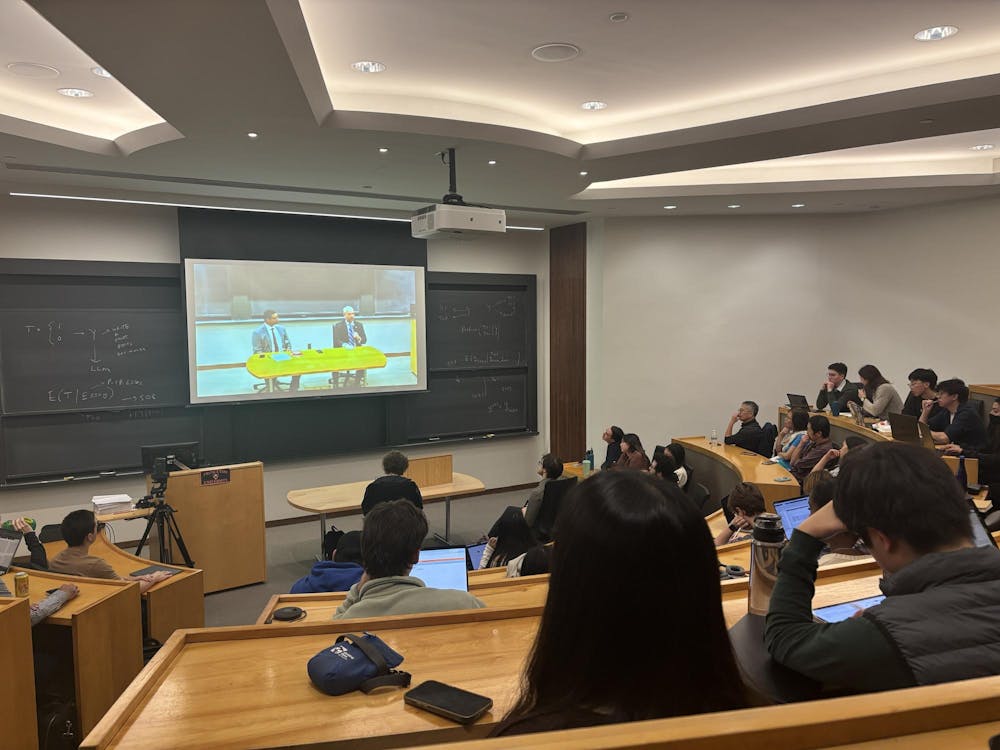On Nov. 20, Kevin Roberts, the president of the Heritage Foundation, joined 50 community members in Robertson 001 for a conversation spanning declining government trust, the newly announced Trump cabinet, and politics on college campuses.
The event, which was open to the public, was titled “Should We Burn It All? A Blueprint for America’s Institutions” and was hosted by the American Whig-Cliosophic Society. It was moderated by Jaden Stewart ’26, the Cliosophic Society chair.
In recent months, Roberts has drawn controversy following Heritage’s publication of “Project 2025,” a 922-page report aimed “to take down the Deep State and return the government to the people.” Policy recommendations in the report include restrictions on abortion access, the end of birthright citizenship, and the banning of “gender ideology.”
One of the most influential conservative voices in America, Roberts was president of the Wyoming Catholic College and served as the executive vice president at the Texas Public Policy Foundation before leading the Heritage Foundation. Even though President-elect Donald Trump distanced himself from Project 2025 throughout his presidential campaign, Roberts enthusiastically celebrated his victory over Harris.
Although a ‘Prince’ exit poll showed that 90 percent of voters in the Princeton community favored Harris for president, Roberts’ visit still drew significant interest on campus. In fact, due to overcrowding, Roberts’ remarks were live-streamed to a spillover room in Robertson 002, where it was viewed by around 50 people. After both Robertson 001 and the spillover room had filled, University staff had to turn away a number of students and community members at the door.
Roberts addressed Princeton’s left-leaning environment and offered suggestions on how the University could evolve both on an administrative and community level.
Roberts encouraged the audience to “speak up” with “great conformance,” citing “a double standard for us at Heritage” and conservatives more broadly. Addressing Princeton’s administration specifically, Roberts urged the “leaders of this institution” to be “more courageous about correcting things that most of them know in their hearts are wrong.”
Despite this, Roberts also spoke to the importance of establishing common interests on campus to build communities that transcend political differences. To illustrate his point, Roberts recalled interactions with a neighbor with radically different political views than his family.
“We know we have pretty serious differences, but because we establish real, very serious, common interests — not the last of which is being a neighbor in the same way — we focus on that, and a friendship has really blossomed,” he said. “We still help them out; they still help us out.”
Addressing the students in the audience, Roberts stressed the importance of being intentional in seeking out diverse communities.
“Set the goal and say, every week, the rest of my time at Princeton, I’m going to talk to new people, or three new people — and even if their politics are off, we’re going to be friends.”
Roberts addressed the failures that he felt lie within America’s government and institutions as they currently stand, criticizing the “decline” in both organizations such as the Boy Scouts of America and the public school system, which he believed had been instrumental in his own childhood but had since declined so significantly that he considered them “an unmitigated disaster” and “on the verge of becoming a disaster,” respectively.

One strategy to rebuild trust in institutions, Roberts highlighted, is for politicians to take advantage of the changing media landscape and to have open conversations with the public.
“We want to rebuild institutions; whether it’s the federal government, or [the] Republican or Democrat[ic] Party, or a principal K–12 school, we must be authentic,” he said. “That’s what we are striving for in Washington, across the political spectrum.”
President-elect Trump’s incoming administration was also a prominent topic of discussion in the conversation. Roberts cited Vice President-elect Vance’s appearance on various alternative media networks as a successful example of driving home the idea of authenticity and integrity to voters.
“He’ll have a conversation anywhere, anytime, on any topic — no BS,” he said. “I think he’s going to be a great vice president, and I think he’s going to be a two-term president.”
In answering a question criticizing some of Trump’s picks for cabinet members, Roberts argued that “expertise and science are used as a way of cutting out politicians — political leaders like RFK [Robert F. Kennedy Jr.] — who actually represent the interests of ordinary Americans, rather than just big, fat, King Street lobbying firms.”
Trump’s cabinet choices include Fox News host Pete Hegseth ’03 for Secretary of Defense, controversial former Congressional representative Matt Gaetz for Attorney General, and Robert F. Kennedy Jr. for Secretary of Health and Human Services.
Sena Chang is a News contributor for the ‘Prince.’
Leela Hensler is a News contributor for the ‘Prince.’
Please send any corrections to corrections[at]dailyprincetonian.com.








